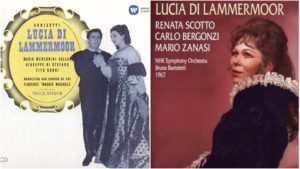
March Madness Part 4: 5 Favorite ‘Lucia Di Lammermoor’ Recordings
By Francisco SalazarMarch Madness is coming to a close. With it, we’ve gone through memorable mad scenes in opera, breathtaking historic moments, and a little bit of musical history on Lucia’s famous mad scene. To close this year’s series, I want to go through my favorite recordings of “Lucia di Lammermoor.” We’ve focused a lot on this opera as it has the most famous mad scene and what most consider one of the best.
So I want to share my favorite recordings.
Edita Gruberova & Alfredo Kraus
To this day Edita Gruberova continues to perform this role around the world and is considered one of the greatest exponents of the title role. She even has three commercial recordings that received praise. But of the three, the one that stands out is the earliest she recorded alongside Alfredo Kraus. The young Gruberova displays a youthful vocal quality, virtuoso technique, and gorgeous spinning phrases. Her mad scene is one of total commitment and through her expressive power she is able to communicate every emotion Lucia is feeling throughout this demanding scene. It doesn’t hurt that Alfredo Kraus is at the height of his powers and that Renato Bruson and Robert Lloyd are also well-cast. It also doesn’t hurt that the music in the version is almost entirely intact.
Leyla Gencer
Leyla Gencer is one of the greatest Bel Canto interpreters and one of the few sopranos who had the high notes and the vocal weight that was initially intended for these demanding roles. As Lucia, Gencer showcases a lighter side to her voice, subtly slimming her vocal colors for the lighter sections and quickly bringing out her dramatic power for the heavier moments in the work. Her duet with Enrico is a noteworthy highlight as both Nino Carta and Gencer showcase impeccable chemistry. But it is Gencer’s virtuoso handling of Donizetti’s music that makes this a must buy. The only issue with this recording is that it is marred by massive cuts.
Andrea Rost
I went from disliking this 1998 recording to absolutely loving it. Yes, it does not have the virtuoso high notes that have become a tradition in opera, but what it is is a document of what Donizetti intended for his work. In this version, Charles Mackerras conducts with the original orchestration except for the glass harmonica and restores the original keys. Rost uses her crystal clear voice to convey a youthful Lucia singing every original ornamentation with effortless coloratura.
Maria Callas and Giuseppe Di Stefano
If there was ever a perfect Lucia, it was Maria Callas. She was an incredible singing actress who knew how to express every line and phrase to perfection. And she had immaculate coloratura lines that easily melted in her voice. Her 1953 recording with Giuseppe Di Stefano is perfection with each performer at the height of their powers. Tulio Serafin drives the tempi, moving the drama forward while Tito Gobbi is a perfect foil for Callas in their extended duet. And what can we say about Callas’ mad scene? Her diction, her phrasing, her coloratura and her climactic E Flats make up one of the most dramatic moments in recorded history.
Renata Scotto
Renata Scotto has two recordings of this opera, but it is her 1967 DVD recording from Tokyo which is a historical document that should be seen. Out of all the DVDs of this opera on the market, this is my personal favorite. It shows a singing actress who was able to act the role as well as spin the coloratura line without any issues. It shows a complete performer whose movements were guided by the phrases in the music and who understood Donizetti dramatically. The version is cut up, but Scotto is a performer one needs to see. It also doesn’t hurt that Carlo Bergonzi stars.
Bonus
There are more recordings that I would recommend including Diana Damrau’s 2015 CD recording which is the most complete version of all the modern recordings released as of late. Anna Moffo, Beverly Sills, Mariella Devia, and Natalie Dessay’s French version also offer up exceptional interpretaions that should be looked at.
And of course, a Lucia collection wouldn’t be complete without Joan Sutherland, who was arguably the greatest exponent of the work. Of all her recordings of the work, it is the 1959 version from the Covent Garden that is my personal favorite.
Categories
Special Features

